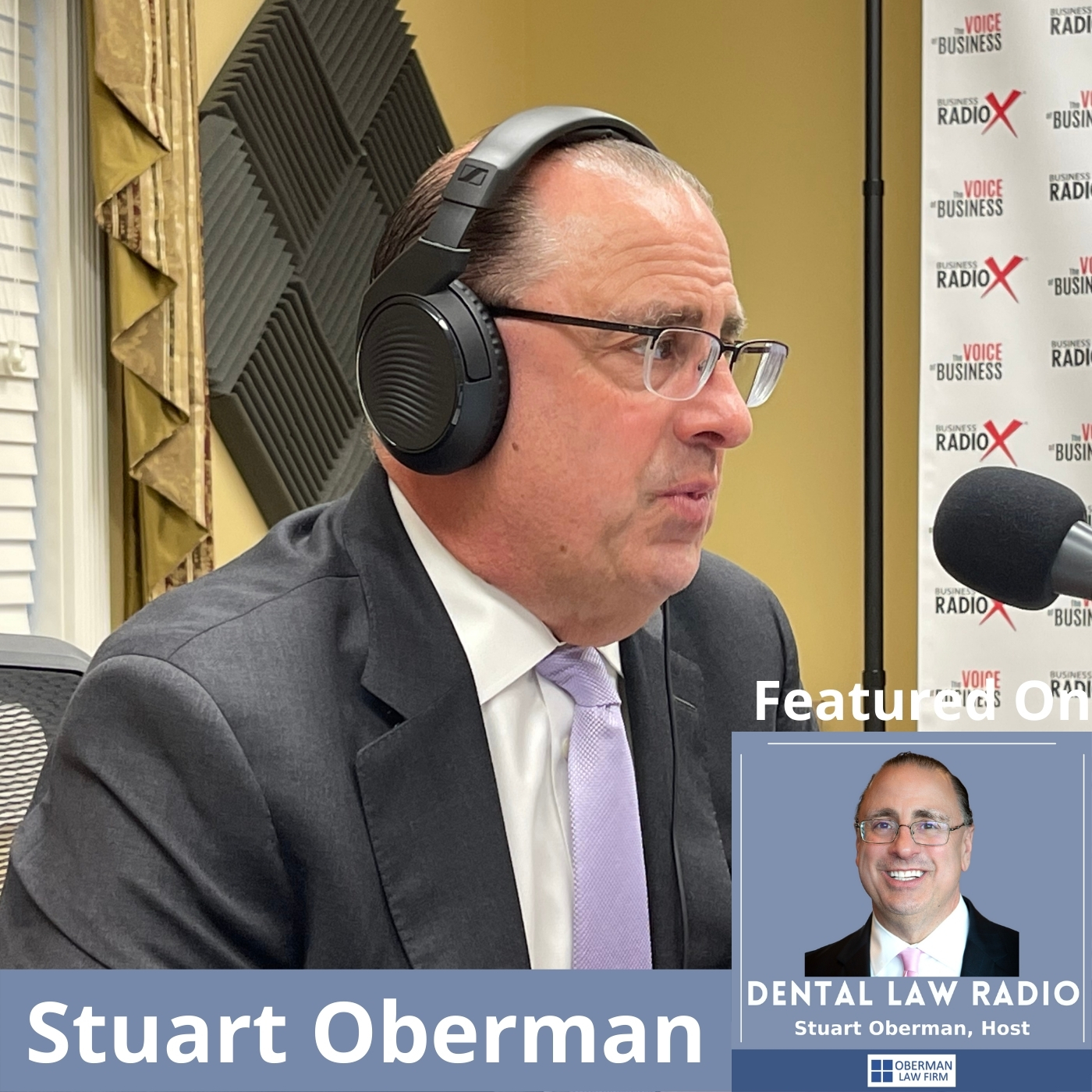
Informed Consent (Dental Law Radio, Episode 25)
Do you seek to avoid malpractice claims and board complaints in your dental practice? Who doesn’t, right? Informed consent is an essential ingredient of that goal. If you don’t know much about informed consent, or you wonder whether the informed consent form you’re using is adequate, then Stuart Oberman offers critical advice on this episode of Dental Law Radio which might save you thousands of dollars. Dental Law Radio is underwritten and presented by Oberman Law Firm and produced by the North Fulton studio of Business RadioX®.
TRANSCRIPT
Intro: [00:00:02] Broadcasting from the Business RadioX Studios in Atlanta, it’s time for Dental Law Radio. Dental Law Radio is brought to you by Oberman Law Firm, a leading dental-centric law firm, serving dental clients on a local, regional and national basis. Now, here’s your host, Stuart Oberman.
Stuart Oberman: [00:00:26] Hello, everyone, and welcome to Dental Law Radio. Today’s topic, risk management. I want to talk about malpractice claims and the board complaints. And, one of the biggest defenses that you could have, and we’re going to talk about informed consent, avoiding malpractice claims, and board complaints.
Stuart Oberman: [00:00:48] First and foremost, I think there’s a misconception from our dental practice owners and associates as to what exactly the informed consent process is. And, it’s very simple. It is a very, very effective tool for malpractice claims and board complaints. And, I will tell you, we are extremely fortunate as a law firm that does a substantial amount of dental work throughout the country. And, by and large, the finest practices that we work with, the finest doctors, the informed consent process is almost nonexistent, which leaves them wide open for a malpractice claim or a dental board complaint.
Stuart Oberman: [00:01:38] So, let’s take a look at some basic things regarding informed consent form. And, I know what you’re thinking, well, you know, well, we don’t really need consent forms. You know, Mary’s been our client for 30 years and she’s never had a problem. That’s great. So, the other 99% of the problems are just waiting to happen.
Stuart Oberman: [00:01:58] So, what is informed consent? I want to make this, you know, our podcast brief. I want to go through a couple of things, but basics. So, the informed consent is nothing more than an educational process to tell the patient in writing and verbally what the benefits are, the risks, the alternative treatments, and to assess the patient’s understanding. You know, the decision regarding process, are you giving your patients and documenting your process and choices to the patient? Most of the time, it’s no. Most of the time it is, well, I don’t really think so. So, it’s basically an open dialogue, written and oral, if you will, so the patient can ask questions.
Stuart Oberman: [00:02:51] So, what should happen is you as a dentist should assess the patient’s understanding of the procedure in place. I don’t care if it’s a drill and fill, whether it’s a graph after an implant. Whether it’s an extraction of a molar, I don’t care. But it’s got to be documented. There has to be a process.
Stuart Oberman: [00:03:22] So, what is the process for the informed consent? First and foremost, it’s initial diagnosis. Are you diagnosing the problem? What is the problem? What is the recommended treatment plan? Now, I’m going to tell you right now. Your treatment plan is not the bill you give your patients. That is not a treatment plan. If you’re going to do a full-mouth restoration, if you’re going to do a multiple tooth implant, if you’re going to do wisdom extractions, what is the plan? Are you doing bridge, whatever maybe? Are you giving your patient ultimate treatment options? Are you allowing them to choose? Or are you telling them what they need to do? You’re going to have to evaluate this on every patient.
Stuart Oberman: [00:04:22] Now, our doctors do not know when to get out of trouble. And, many times they can’t get out of their own way. Are you giving the patient the option to refer to a specialist? I’m going to tell you now. Folks, if it’s not in your wheelhouse, get out of it. If you don’t do it every day, get out of it. We’ve run into multiple problems where our doctors will go to a weekend course and all of a sudden they’re an absolute expert in the area of implants. They’re now an expert in finding the B2 canal. Let me tell you, some of the best and Adonis that I know have trouble finding the B2 canal. If you don’t do root canals, stay out of the arena. Refer it out. It’ll be much easier on your life and your checkbook if you do that.
Stuart Oberman: [00:05:27] Outline the potential risks. All this has to be in writing. Okay. You can’t just say, “Well, here it is. Here’s your options I told you,” or, “You know, I made a note and you said, no.” You’ve got to have this documented to the T. What are the risks for not treating? Now, you’re probably thinking to yourself, “Look, Stuart, man, I’m seeing 30 patients a day. How in the world can I do this on every patient?” The question is how can you not do this because it’s going to have one that’s going to blow up on you. So, how you schedule is up to you. How you get this information is up to you. How you delegate this is up to you.
Stuart Oberman: [00:06:10] But you’ve got to do that. Give the patient the opportunity to ask questions. Pros and cons. What are the options? And, I will tell you, all this has to be documented in your charts. If it is not in your charts, I don’t care if you write on a sticky. I don’t care if you have the most complex digital system or your still charts. If it’s not in your notes, it never happened. Options. Again, things go wrong in an operatory. Things break.
Stuart Oberman: [00:06:52] Client of mine sent me a text and wanted to know can a dog come into the operatory and sit on a patient’s lap. How do you make that question up? How do you make that question? You don’t make it up because it happens. And, the next question is, well, it’s, you know, it’s a companion dog.
Stuart Oberman: [00:07:20] I’m going to go out on a broad limb here. Folks, I’m going to tell you right now. You cannot have dogs in your operatory. You cannot have dogs on your patient’s lap when you got high-speed drills at one wrong move is going through someone’s mouth, tongue, eye.
Stuart Oberman: [00:07:37] So, those are the things that you’ve got to take a look at. And, those are things you’ve got to have a risk assessment on.
Stuart Oberman: [00:07:47] So, again, documentation is critical, so in informed consents. Okay. Now, I’ve seen some really bad informed consents. I’ve seen informed consents that are so basic they will never cover anything complex like an extraction, root canal, bridge. They’re too, too basic. So, what should they include? Again, I’m talking to a separate document risk-benefit analysis. One included a doctor’s name, procedure. Do I need an informed consent for every treatment that I do? I think you do. If I’m going to my dentist, who’s fantastic by the way, hope he’s listening, and I’m getting a root canal and then a month later, I’m getting an extraction. I will guarantee you my informed consent will not cover that and it needs to be a new one.
Stuart Oberman: [00:08:47] What are the alternative treatments? What are the risks for not treating? What are the questions? How much time is involved? The date? Witness the informed consent. Place a copy in the patient’s file. “Well, you know, Stuart, I don’t have hard files anymore.” Great. Get a hard file. I have clients that have an amazing digital system, but yet they will still have a hard copy of an informed consent. What are you going to do?
Stuart Oberman: [00:09:26] Regarding the call I got yesterday, client’s buying a practice. Failure on the server. X-rays, charts wiped out. They can’t recover everything. What are you going to do? And, you got a board complaint or malpractice claim, and all of a sudden you’ve got a failure and you can’t find that consent form. What are you going to do? You’re going to be in a bad place. That’s what’s going to be.
Stuart Oberman: [00:09:58] I’m very serious about informed consent form because I see what they can do, I see what they can’t do and I see in the problems. What happens is when you don’t have them, it’s basically damage control.
Stuart Oberman: [00:10:10] Now, for informed consent, it’s going to get a little tricky. But if you have minors and special needs individuals, you’ve got to take the extra steps to getting those done correctly. You know, with special needs patients, we do work guardianships for special needs patients, and that’s a whole different area. But who’s the guardian? Is the guardian signing the informed consent? Have you documented who the guardian is?
Stuart Oberman: [00:10:35] Divorce cases. Can you imagine what it’s like dealing with a divorce case with a minor child in your office? Who’s in charge? Who’s signing the informed consent? Dad, mom don’t even have visitation. Who’s going to sign? Does grandma have the authority to bring the child in the authorized treatment? No, they do not, most of the time.
Stuart Oberman: [00:11:00] So, also in our diverse world that we live in where English may not be our first language and you have a cultural base. Are you drafting these documents to your base, or are you saying I know your English is not good, I know it’s not our first language? Are you curtailing this so they understand? Chances are probably not. You have an obligation to do so.
Stuart Oberman: [00:11:39] What if your patient is blind? How are you doing – how are you working with that? What are you doing if your patient is hard of hearing? It’s elderly and can’t hear. How are you doing it? What are you doing for this? Well, you explain to them. Well, how do you relate that into a board complaint? Where’s the proof?
Stuart Oberman: [00:12:03] So, now you get into this situation where, you know, my patient is refusing x-rays. Let me tell you this. So, if your patient is refusing x-rays because of cost, you have two choices. One, run quickly away from that patient, or, two, absorb the cost, document the file. My thought is run quickly. A patient should never dictate the standard of care because they’re going to be the first ones to say to you, “Oh, you messed up, doc.”
Stuart Oberman: [00:12:41] So, then you got to document the refusal and I mean get them to sign something. “Well, you know, they refused. They told me they refused.” Not good enough. Got to be documented. I don’t care how you document it. I don’t care whether it’s on an iPad, whether they sign a document, get it documented. You should have a process for refusal, and I’m gonna tell you right now, if your patients are refusing treatment, you need to find another patient because that is a problem waiting to happen.
Stuart Oberman: [00:13:11] So, these are just a couple of things on informed consent. I can’t really stress how important informed consents are from a legal standpoint, malpractice, and board complaint wise and how simple they are. If you have a patient that refuses to sign a consent form, you need to move on down the road and not treat them. Because as soon as you treat them, you bought that patient, and then you bought the problems that go with it. So, it’s the little things to avoid problems on the informed consent side.
Stuart Oberman: [00:13:41] Again, the whole topic for another day. You know, I could talk three hours on consent forms, the laws, and what we look at, but it’s critical. It’s critical. It’s critical.
Stuart Oberman: [00:13:49] So, [inaudible], thank you, everyone, for joining us today. Informed consents. Please make sure every patient has one. If you don’t have them, please get them.
Stuart Oberman: [00:14:02] I want to wish everyone a fantastic day. Thank you for joining Dental Law Radio. My name is Stuart Oberman. If you have any questions, please feel free to give us a call at 770-886-2400 or stuart, S-T-U-A-R-T, @obermanlaw.com. Thank you, folks. And, we will see you soon.
About Dental Law Radio
Hosted by Stuart Oberman, a nationally recognized authority in dental law, Dental Law Radio covers legal, business, and other operating issues and topics of vital concern to dentists and dental practice owners. The show is produced by the North Fulton studio of Business RadioX® and can be found on all the major podcast apps. The complete show archive is here.
Stuart Oberman, Oberman Law Firm

Stuart Oberman is the founder and President of Oberman Law Firm. Mr. Oberman graduated from Urbana University and received his law degree from John Marshall Law School. Mr. Oberman has been practicing law for over 25 years, and before going into private practice, Mr. Oberman was in-house counsel for a Fortune 500 Company. Mr. Oberman is widely regarded as the go-to attorney in the area of Dental Law, which includes DSO formation, corporate business structures, mergers and acquisitions, regulatory compliance, advertising regulations, HIPAA, Compliance, and employment law regulations that affect dental practices.
In addition, Mr. Oberman’s expertise in the health care industry includes advising clients in the complex regulatory landscape as it relates to telehealth and telemedicine, including compliance of corporate structures, third-party reimbursement, contract negotiations, technology, health care fraud and abuse law (Anti-Kickback Statute and the State Law), professional liability risk management, federal and state regulations.
As the long-term care industry evolves, Mr. Oberman has the knowledge and experience to guide clients in the long-term care sector with respect to corporate and regulatory matters, assisted living facilities, continuing care retirement communities (CCRCs). In addition, Mr. Oberman’s practice also focuses on health care facility acquisitions and other changes of ownership, as well as related licensure and Medicare/Medicaid certification matters, CCRC registrations, long-term care/skilled nursing facility management, operating agreements, assisted living licensure matters, and health care joint ventures.
In addition to his expertise in the health care industry, Mr. Oberman has a nationwide practice that focuses on all facets of contractual disputes, including corporate governance, fiduciary duty, trade secrets, unfair competition, covenants not to compete, trademark and copyright infringement, fraud, and deceptive trade practices, and other business-related matters. Mr. Oberman also represents clients throughout the United States in a wide range of practice areas, including mergers & acquisitions, partnership agreements, commercial real estate, entity formation, employment law, commercial leasing, intellectual property, and HIPAA/OSHA compliance.
Mr. Oberman is a national lecturer and has published articles in the U.S. and Canada.
Oberman Law Firm
Oberman Law Firm has a long history of civic service, noted national, regional, and local clients, and stands among the Southeast’s eminent and fast-growing full-service law firms. Oberman Law Firm’s areas of practice include Business Planning, Commercial & Technology Transactions, Corporate, Employment & Labor, Estate Planning, Health Care, Intellectual Property, Litigation, Privacy & Data Security, and Real Estate.
By meeting their client’s goals and becoming a trusted partner and advocate for our clients, their attorneys are recognized as legal go-getters who provide value-added service. Their attorneys understand that in a rapidly changing legal market, clients have new expectations, constantly evolving choices, and operate in an environment of heightened reputational and commercial risk.
Oberman Law Firm’s strength is its ability to solve complex legal problems by collaborating across borders and practice areas.
Connect with Oberman Law Firm:
Company website | LinkedIn | Twitter
















